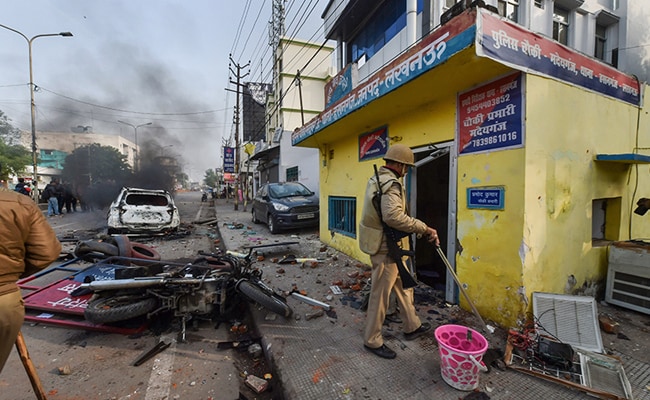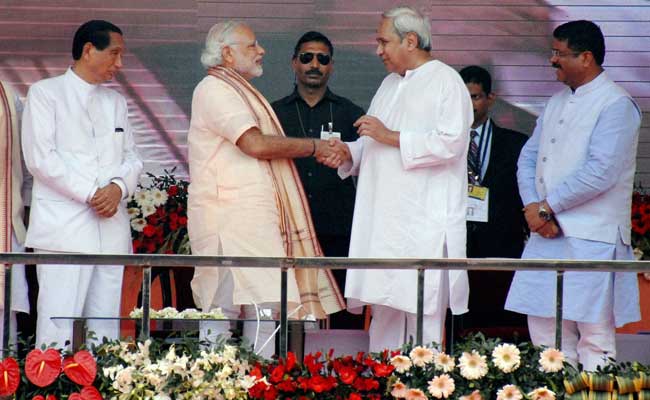As thousands of people gathered at the August Kranti Maidan in Mumbai, Chief Minister Uddhav Thackeray showed his leadership chops by not just allowing but facilitating the massive rally against the flawed Citizenship Amendment Act (CAA) and its bigoted twin, the National Citizens Register.
Thackeray, much derided by the BJP during their soap opera alliance, showed up his former partner by ensuring the police remained on the side of protesters who in turn remained completely peaceful. This contrasted dramatically with the crackdown on CAA protests in BJP-ruled states including Karnataka where intellectual Ramachandra Guha was detained by the police in Bengaluru (Chief Minister BS Yediyurappa later expressed his regret for the incident).

Historian Ramachandra Guha was dragged by the police mid-interview as he was detained along with dozens in Bengaluru
The spectacle of Guha being manhandled by three policemen when he was speaking to a television channel and the shutting down of internet for the first time ever in Delhi was absorbed by an alarmed India. As protests over CAA approach ten days, union Home Minister Amit Shah, the face of the controversial legislation, has doubled down, declaring that he is "rock like" in his determination to implement the changes that basically decide citizenship on religion and discriminate against Muslims.
Shah's approach was echoed by Yogi Adityanath, UP Chief Minister, who warned "revenge" against "protestors destroying public property". Debating the propriety of an elected representative talking of "revenge" is pointless - this is vintage Yogi.

The police used batons to quell protests at the protest site in Lucknow, where nearly 10 vehicles were set ablaze
The question that now needs to be asked is whether the CAA/NRC the first political failure of the all- powerful Shah. The reading down of Article 370 (taking away the special status of Kashmir) and reducing the only Muslim-majority state of the country to a union territory, coupled with the four-month-long communication lockdown in Kashmir, which was a Shah initiative lovingly described as a "master stroke" by his Panna Pramukhs in the media, seems to have given Shah an appetite to ram through contentious majoritarian legislation.
But there is pushback now - not just from thousands of students and others but from state leaders; seven Chief Minister say they will not allow the NRC in their states. This lot includes BJP ally and Bihar Chief Minister Nitish Kumar and Naveen Patnaik, Odisha Chief Minister whose party voted for the CAA in parliament.

PM Modi with Odisha Chief Minister Naveen Patnaik (File photo)
The NRC was designed by Shah to win the West Bengal election due in 2021. Shah has reportedly told senior BJP leaders and the RSS chief that this was his dream for the Sangh. West Bengal has a large Muslim population and Shah has portrayed Chief Mamata Banerjee as practising minority appeasement. The BJP is seeking to encash on the large migrant Hindu population of West Bengal with the NRC rolling out just in time for the state's election. Banerjee has been fierce in her resistance to Shah and after he triumphed by winning 18 of the 42 Lok Sabha seats in the 2019 election, she hired election strategist Prashant Kishor and has been on a campaign overdrive.

Chief Minister Mamata Banerjee has refused to implement the Centre's new citizenship law and the National Registry of Citizens
Kishor, who is a vice-president of Nitish Kumar's Janata Dal United, has been instrumental in Kumar declaring, belatedly, that he will not allow the NRC in Bihar, the latest development in his highly elastic political conscience and in keeping with his finely-honed instincts to stay in power.
Just seven months ago, the BJP won a second term under Modi with an improved majority. After that, the BJP has not been having a great electoral run with Maharashtra slipping out of its grip and Haryana not giving the BJP a massive win. The upcoming election in Jharkhand and Delhi will also see a real contest, not a walkover, for the BJP.

Prashant Kishor and Nitish Kumar (File photo)
Modi and Shah run perhaps the most ideological government in India's history and are checking off promises which are unique to their party's manifesto. Post the NRC resistance, expect the government to double down on contentious manifesto promises. Coming up, a universal civil code and a population policy for a small family. Modi and Shah are priming the BJP base as the economy contracts now for six straight quarters. The BJP feels that the economic pain will be offset by a majoritarian schadenfreude which makes the Hindus feel like permanent victims.

Protestors at Mumbai's August Kranti Maidan
Yet this ramming through of a majoritarian agenda will now meet with resistance as regional parties are clear on opposing the BJP trampling on the federal structure of the polity. Perhaps NDTV put it best in its coverage yesterday, calling it "India versus Lockdown". The adversarial mood of the Modi government is on display as neither Modi nor Shah attempted even a token outreach to the protestors, students on 22 campuses and those whose family members died in the face-off. Lockdown and doubling down.
(Swati Chaturvedi is an author and a journalist who has worked with The Indian Express, The Statesman and The Hindustan Times.)
Disclaimer: The opinions expressed within this article are the personal opinions of the author. The facts and opinions appearing in the article do not reflect the views of NDTV and NDTV does not assume any responsibility or liability for the same.


